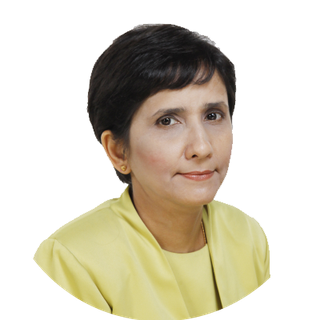CapitaLand banks on divestment discipline to pounce on good opportunities
Net profit falls 4.2% to S$579.81m, due largely to S$36m transaction costs for ASB acquisition

Singapore
CRISIS is also a time of opportunity and property giant CapitaLand, which completed its acquisition of Ascendas-Singbridge (ASB) in late-June, is making sure it is well prepared and agile to pounce on any good opportunities amid the current uncertain business climate.
Its disciplined approach to divesting and deleveraging will create the headroom it may need to seize these opportunities, the group's top brass highlighted at a briefing on Wednesday after unveiling a 4.2 per cent drop in second-quarter net profit.
"We have more Reits (real estate investment trusts), more private equity funds than many of our competitors. And that gives us, I would say, much greater optionality... in recycling stabilised assets.
"As long as we focus on our key strengths, focus on where our competitive advantage is, continue to build our capabilities, attract good people, I think that we should be able to ride through any types of crisis," said Lee Chee Koon, group chief executive of CapitaLand Group.
Group chief financial officer Andrew Lim highlighted the potential to grow CapitaLand's net asset value, with the recently acquired ASB portfolio - for instance, by rejuvenating vintage assets such as those at Science Park 1.
So far this year, the group has announced gross divestments to the tune of S$3.4 billion - of which S$1.2 billion have been completed as of the first half.
"So the key message is that there are embedded net proceeds coming back to CapitaLand in the second half of this year, which means there is an embedded net deleveraging effect that is coming back to CapitaLand in the second half," said Mr Lim.
Of the year-to-date announced gross divestments, CapitaLand's effective stake is about S$2.6 billion.
Looking at the other side of the coin, the group has S$1.3 billion effective stake of the YTD S$3.3 billion gross value of investments the group has made.
On a net basis, the capital released to the group is S$1.3 billion. This results in a "deleveraging effect, depending on the capital structure".
"But it also means there is capital coming back to us which we can use for deployment, opportunistically, should the right opportunity arise," said Mr Lim.
Already, the group's cash balances and available undrawn facilities stood at about S$10 billion as at June 30 this year. The debt maturity profile is also healthy at 3.4 years, it added.
CapitaLand's net debt to equity stood at 0.73 time as at end-June 2019, a tad above the proforma figure of 0.72 it had indicated earlier. "But we are confident of getting it down to our 0.64 target by the end of next year," said Mr Lim.
"If we get there ahead of time, then it means we have more headroom to allow us to evaluate interesting opportunities that may come up."
Net profit for Q2 ended June 30 fell to S$579.81 million from S$605.52 million in the year-ago period. This was largely due to the S$36 million in one-off transaction costs incurred on the ASB acquisition; excluding this item, Q2 net profit would have been up 1.7 per cent.
Giving a split of the components of net profit, CapitaLand said operating Patmi (profit after tax and minority interests) slipped 8.4 per cent to S$179.5 million in Q2 FY2019 on the back of lower contribution from residential property business (owing to timing effect of the handover of residential units at the group's projects in China); this was mitigated by higher income from investment property.
Portfolio gains and realised fair value gains fell 25.3 per cent to S$53.8 million - hit by the ASB acquisition transaction costs. Unrealised revaluations and impairments rose 2.7 per cent to S$346.5 million - underpinned by strong operating performance of the revalued properties.
Pretty much the same factors were at play in the first-half results, with net profit down 5.3 per cent at S$875.37 million.
Earnings per share (EPS) fell to 13.9 Singapore cents in Q2 from 14.4 cents in the year-ago period.
Net asset value per share declined to S$4.45 as at end-June 2019 from S$4.55 as at end-December 2018.
The counter ended one cent lower at S$3.47 on Wednesday.
ASB will start contributing to CapitaLand's income statement from the third quarter of 2019.
CapitaLand and ASB's combined real estate assets under management stood at S$129.1 billion as at end June 2019. Of this figure, S$70.6 billion is in eight Reits and 23 private funds.
Mr Lee elaborated on how the group manages capital recycling through three buckets. The first bucket comprises non-core assets which the group is prepared to let go of - at the right price.
In the second bucket are assets that are already stabilised and ripe to be held by the group's Reits.
The third bucket holds assets that are still in the ramp-up stage, with potential for enhancement works to unlock their value before they can be moved to the second bucket.
He noted that CapitaLand's Singapore involvement previously was only in residential, retail and office developments. But that was pre-ASB, whose portfolio includes industrial and logistics and business park space. "I think Singapore will be quite interesting (for us) in terms of rejuvenation play in next few years for our portfolio."
KEYWORDS IN THIS ARTICLE
BT is now on Telegram!
For daily updates on weekdays and specially selected content for the weekend. Subscribe to t.me/BizTimes
Companies & Markets
Tokyo's Nikkei drops more than 1,000 points, most in 3 years
Cordlife requests trading halt after dropping 15.2% to all-time low, pending announcement
Gazelle Ventures makes cash offer for No Signboard shares at S$0.0021 apiece
Inside TSMC chairman Mark Liu's short but impactful reign
CSE Global bags US$36.5 million data centre contract extension
Keppel DC Reit reports 13.7% lower Q1 DPU of S$0.02192 amid loss allowances
